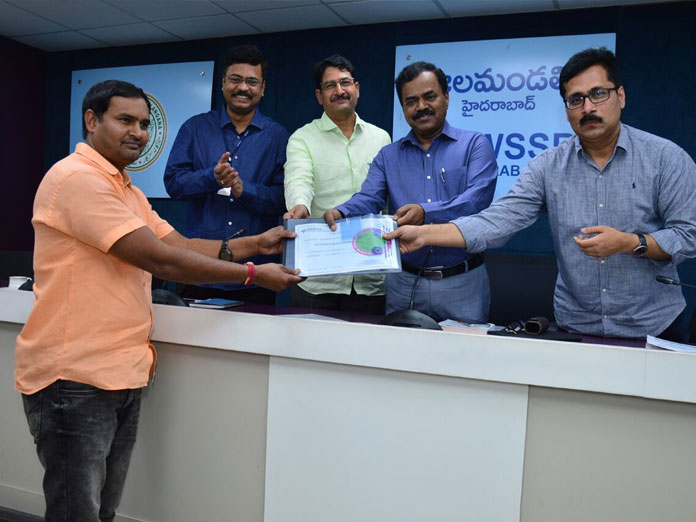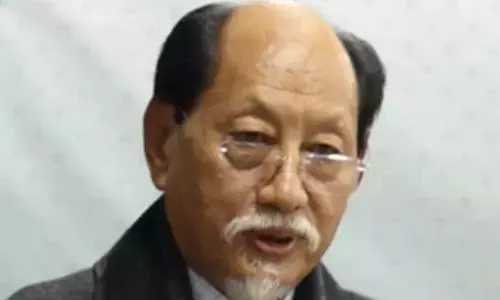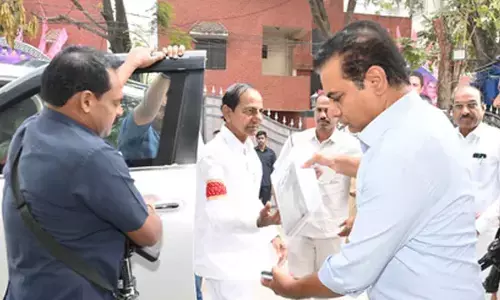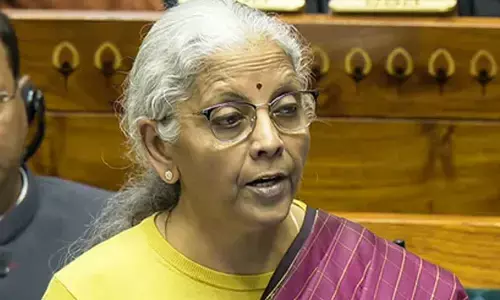Major initiative for Swachh Hyderabad

Hyderabad Metropolitan Water Supply and Sewerage Board HMWSSB has stated that its recent initiatives made significant progress in enhancing coverage of toilet, sewerage system and waste water treatment capacities While the coverage in the core area is over 90 per cent, the overall coverage of sewer system in the HMWSSB area is about 60 percen
Khairatababad: Hyderabad Metropolitan Water Supply and Sewerage Board (HMWSSB) has stated that its recent initiatives made significant progress in enhancing coverage of toilet, sewerage system and waste water treatment capacities. While the coverage in the core area is over 90 per cent, the overall coverage of sewer system in the HMWSSB area is about 60 percent.
The non-sewered areas are covered with on-site sanitation system such as septic tanks, it said in a press statement on Wednesday.Hyderabad is currently facing a large burden of untreated faecal waste entering the environment due to indiscriminate disposal of septage (waste evacuated from septic tanks periodically) by unregulated private de-sludgers causing significant public health and environmental risks.
A large quantity of faecal waste is also generated by over 300 mobile toilets operated in the city.To achieve the vision of Swachh Telangana, the Government of Telangana through a GO on September 29, 2018 issued a policy on Faecal Sludge and Septage Management (FSSM) and encouraged all urban local bodies (ULBs) to establish FSTPs (Faecal Sludge Treatment Plants) or promote co-treatment of faecal sludge at the existing sewage treatment plants (STPs). This policy is aimed to regulate provision of toilets, safe collection, treatment and disposal of faecal sludge and septage in urban areas Telangana.
In alignment with this vision, HMWSSB proposes to introduce safe management of Faecal Sludge and Septage in Hyderabad on a mission mode to realise the goal of Open Defecation Free plus (ODF + and ODF ++).
Hyderabad has 18 STPs and these facilities can be gainfully used to co-treat the septage. The co-treatment process involves establishing a holding tank including stirring facility/recirculation system for homogenization of sludge and valve operation for controlled discharge of septage into the functional STPs. Further, to accomplish the goals of ODF++, HMWSSB envisages to have a regulatory system for licensing the de-sludging operatorsto prevent open dumping of septagein open areas.
This can be achieved by empanelling the private desludging operators, training de-sludgers on the use of Personal Protective Equipment (PPE), record keeping during desludging operations etc.
On November 20 last, HMWSSB requested Administrative Staff College of India (ASCI) to submit a proposal for preparation of detailed project reports and operational plan for septage management in Hyderabad and extend implementation support.
The National Policy on FSSMandthe State Policy (Government of Telangana), emphasise the importance of utilising the existing STPs for co-treatment of septage. There are 18 STPs in the city which can be gainfully converted to co-treat the septage after careful examination.
The 18 STPs have an installed treatment capacity of over 718 MLD.
The objective of the sewage treatment is to treat the wastewater to meet the required environmental norms and to protect the environment. HMWSSB plays a crucial role in this perspective and involved in planning, design, construction, operation & maintenance of Sewage Treatment Plants. About 600 MLD of the wastewater generated is treated at four major STPs located at atAmberpet, Nagole, Nallacheruvu and Attapur.
After meetings and thorough discussions with the concerned STP division officials, a dedicated team of professionals from ASCI undertook field visits to the existing (18) STPs located in different parts of the city.The team carried out a detailed assessment to attain a clear understanding of the current scenario of the STPs.
During the field visit to each STP, the team collected information on the following aspects:
Land area, STP layout, date of commissioning, design capacity, existing unit operations such as capacities and dimensions, design parameters (inlet and outlet), pollution parameters for monitoring (inlet and outlet), hydraulic flow measurements at different times of the day, hydraulic flow diagram, details of treatment technology etc.
Availability of land for establishing receiving and holding facility of septage
Existing lab facilities for carrying out monitoring relating to septage parameters were
Existing staff presence in each STP location.
Draft design for co-treatment
Based on the field data collected by ASCI team, the feasibility for co-treatment of septage was worked out for all existing STPs. In view of this, a draft design for co-treatment was prepared for piloting at four locations.
The locations were selected on the basis of:
Septic tank truck accessibility to the designated STP
Functionality and performance of STP
BOD inlet design parameters
Availability of spare capacity for receiving faecal sludge
Major areas of desludging operations
Operator’s preference for decantingthe sludge in the nearby STPs
The four locations selected are:
Amberpet STP, 339 MLD; Khajaguda STP, 7 MLD; Miralam STP, 10 MLD and Nallacheruvu STP, 30 MLD
Mapping desludging operations
In line with the FSSM Policy issued by the Government of Telangana, HMWSSB has taken a step forward in establishing a system of licensing to regulate desludging operationswhich will facilitate the enforcement of health and safety standards and prevent indiscriminate dumping of septage in open areas.In this regard, a systematic approach was carried out by ASCI team to map the desludging operators and encouraging the operators for empanelment. Following are the activities carried out so far.
Identifying desludging operators
The first step towards empanelment is identification of desludging operators (regulated and unregulated) in different areas in Hyderabad and their coverage zone. The contact numbers of desludging operators were obtained from various sources on internet such as Just Dial, Sulekha.com etc. Initially, few operators were identified and invited to ASCI to brief them about licensing.
A meeting was held by ASCI team (association members) to make the desludging operators realize about the current practices being adopted for decanting the sludge and effects of such unregulated practices on environments and public health. They were briefed about initiatives taken in Warangal and how empanelment would benefit in smooth functioning of their business and contributing to the State in achieving its goals towards ODF++.
A press note was released by HMWSSB on January 1, calling all the private de-sludgers to apply for licenses within a weeks’ time. The concept was also released in all the newspapers to reach all the desludging operators and promoting awareness in the citizens.All the desludging operators shall obtain licenses for collection and transportation operations in the format prescribed by HMWSSB.
The advertisement clearly stated that the vehicles of those operators will be seized who fail to register. Further, they would be penalized and their licenses will be revoked.
As on date, about 42operators registered for empanelment (51 applications received).
HMWSSB MDDana Kishore called upon all unregistered desludging operators to register immediately, failing which their vehicles will be seized.
The licensed operators were given a sticker as certification mark for their vehicles and a manifest booklet to maintain records of desludging operations. Certificates were also distributed to the operators.














